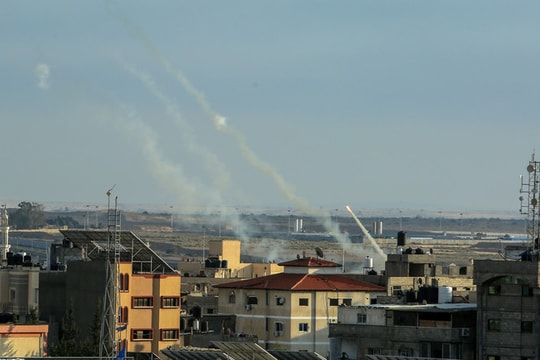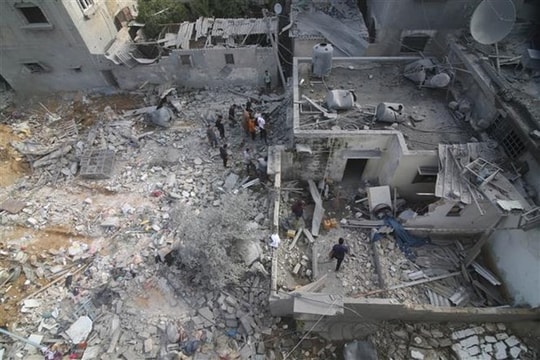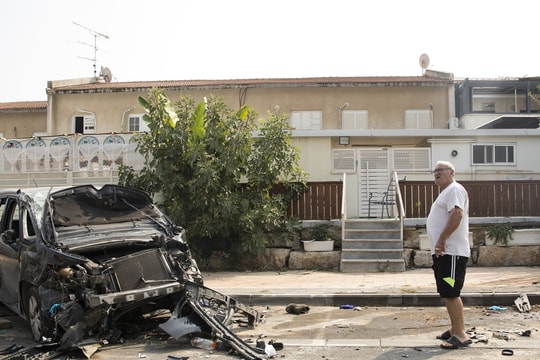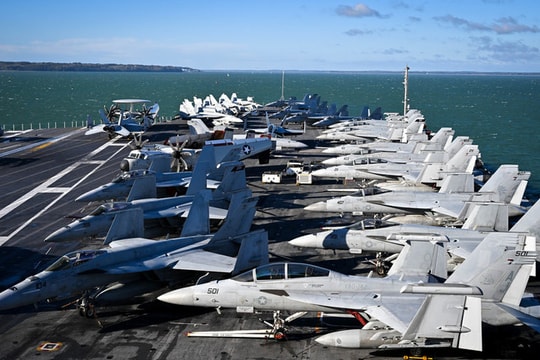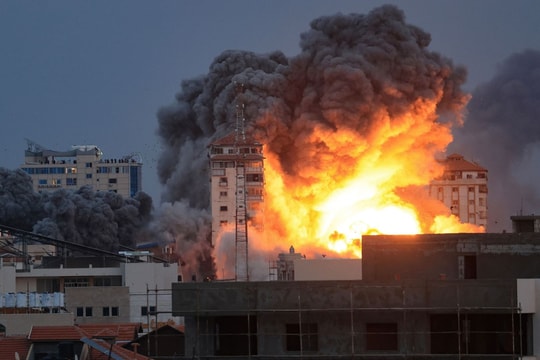Hamas' surprise attack hits Israel's AI pride
(Baonghean.vn) - On September 27, just one week before Hamas launched its largest surprise attack on Israel since 1973, Israeli officials brought the Chairman of NATO's Military Committee to the Gaza border area to introduce their use of artificial intelligence (AI) and high-tech surveillance.

Intelligence failure
According to Reuters, Israeli officials have spoken openly about using such technology in their most recent major war in Gaza in 2021, and both their best AI and their latest drones will surely once again help select and destroy targets in the territory.
However, the failure of these systems to provide advance warning of the Hamas attack on Saturday represents an intelligence failure that will likely be studied and discussed for years to come.
The scale of the weekend's events is only just becoming clear, with 700 Israelis now believed to have been killed and hundreds of Palestinians killed in retaliatory attacks on Gaza.
Numerous Israeli frontline military positions and communities near Gaza have been attacked, in many cases with seemingly little or no warning, while the scale of Hamas rocket launches has sometimes overwhelmed Israel's sophisticated Iron Dome defense system.
The US and allied intelligence agencies that congratulated themselves on their early warning of Russia’s military campaign in Ukraine in February 2022 now appear to have been caught off guard. They may also be looking at what happened to learn lessons to avoid a repeat.
“There would have been warning signs,” said a former Western intelligence official, who spoke on condition of anonymity. “Clearly, Hamas could have done this without leaving any data trail, or there were clues that were there but were not interpreted from the data.”
From drones using facial recognition software to border checkpoints and electronic devices that intercept communications, Israel's intelligence and surveillance operations in Gaza are considered among the most robust and sophisticated anywhere.

Dutch Admiral Robert Bauer visited Israel last month, partly to learn from the expertise of Israel's nearby Gaza Division, and partly to "explore innovative military possibilities," according to a NATO statement.
In May, Israel's Defense Ministry Director-General Eyal Zamir said the country was on track to become an artificial intelligence "superpower," using such techniques to ensure speed and efficiency in decision-making and analysis.
Yet the events of this past weekend suggest that the Israeli government has become overconfident in those capabilities, and that could serve as a warning to other governments as they increasingly turn to artificial intelligence contractors with the promise of accurate analysis and early warning.
Such techniques could be invaluable for synthesizing vast amounts of data, especially in technical fields like sonar or radar. But they are only as good as the raw “input” data – and human activity in a dense, urban environment like Gaza is almost impossible to interpret in a straightforward, easy way.
Israel's air and perhaps soon ground counterattack on Gaza will be seen as an opportunity to retaliate against the Hamas offensive, while also reaffirming the credibility and reputation of the Israeli security state and the high-tech industry that supports it - with Israeli officials arguing that any resulting civilian casualties will be Hamas's fault.
Israeli officials say each of their previous wars and campaigns in Gaza used intelligence and staged attacks with ever greater precision – but the 2021 attacks still left nearly 350 Palestinians dead. The targets being struck now may have been gathered and collated for months or years.

Hiding in plain sight?
In concealing its offensive, Hamas may have been aided by the situation in the Gaza Strip, where it has been in power since 2007 and some 2.3 million people live in cramped conditions behind a 51-km border.
Gaza's dense population and dense housing may have allowed Hamas to position equipment like bulldozers close enough to the fenced border to be deployed quickly - perhaps without the need for potentially monitored communications.
It is unclear how much advance notice the militants had of the attack plans from their commanders, but given Israel's reputation for recruiting, Hamas commanders likely kept their plans extremely secret.
Even a few hours or minutes of advance warning could have made a difference for Israeli soldiers and residents living near the border with Gaza. The final moments before the attack – when movements could be more easily monitored – could have been missed during the Sukkot religious holiday, as well as prior training, including that of the paragliders.
The other big question, for both Israel and the world, is what could other nations and their proxies have known in advance?
According to information from former Israeli military spokesman Jacob Dallal, writing in the Times of Israel over the weekend, Israeli intelligence this fall believes the much bigger threat is an attack from the Iran-backed Hezbollah organization launched from Lebanon.
Israel may still fear that the Hamas attack from Gaza is a precursor to that. Hezbollah said on October 8 that it had fired rockets and artillery at three locations in Israel “in solidarity” with the Palestinian people.
Israel may also be more suspicious of Egypt, which has pledged to secure Gaza's borders, as well as Qatar, which hosts Hamas's political headquarters and brokered a deal between the group and Israel to reopen the Israel-Gaza crossings in late September after a two-week closure.
As Israel attempts to rescue hostages, the two countries may still be among the best places to conduct negotiations. However, with speculation that many other Americans and foreign nationals may have also been executed or captured, Hamas could soon face consequences from the US, and possibly wider military action.

Complex regional relationships
Hamas has described its weekend offensive as an attempt to “liberate” Jerusalem’s Al-Aqsa mosque compound, the site of several confrontations between Jewish nationalists and Palestinian protesters. In doing so, it appears to be hoping to exploit already widespread regional dissatisfaction with Israel and, in particular, the government of Prime Minister Benjamin Netanyahu.
That – along with anger over Israel’s strong military response in Gaza – could complicate a forthcoming US-brokered deal between Saudi Arabia and Israel, based on a similar pact with the United Arab Emirates. Blocking the deal would clearly benefit Iran, according to Reuters.
Immediate statements from Tehran expressing support for the Hamas attacks – as well as what Israel says are long-standing efforts to ship weapons to both Hamas and Hezbollah – will also add to Israel’s suspicions that Iran was directly involved in the weekend attack.
Israel’s border with Syria, controlled in parts by the Islamic State, is also in a state of uncertainty. The situation is similar in Syria, where Russia, China and Iran have all quietly increased their support for Mr. Assad’s government. Other forces remain in Syria, including the United States last week, which took the unusual step of shooting down a Turkish drone it said appeared to be threatening its own forces and their Kurdish allies.
All of this reflects the complexities and confusion that have arisen in the region in recent years, especially after the conflict in Ukraine. US and Western officials have pressured Israel to reduce its ties with Russia, and have successfully persuaded much of the country’s government and technology companies to withdraw their quietly growing financial ties with China.
Last month, Mossad Director David Barnea told a conference that Israel was concerned that Russia might sell Iran advanced weapons in exchange for vital drones. Hamas leaders said they met Russian Foreign Minister Sergey Lavrov in Moscow earlier this year.
For its part, since the Hamas attack, Russia has reaffirmed its support for an independent Palestinian state and called for a ceasefire while Israeli officials have directly criticized China for not condemning Hamas.
The possibility that Moscow or Beijing directly encouraged Hamas to carry out the actions that occurred this week—even covertly through Iran—is considered unlikely. Still, officials in both capitals will be watching events closely, drawing any lessons that can be applied to their own current and future confrontations.

